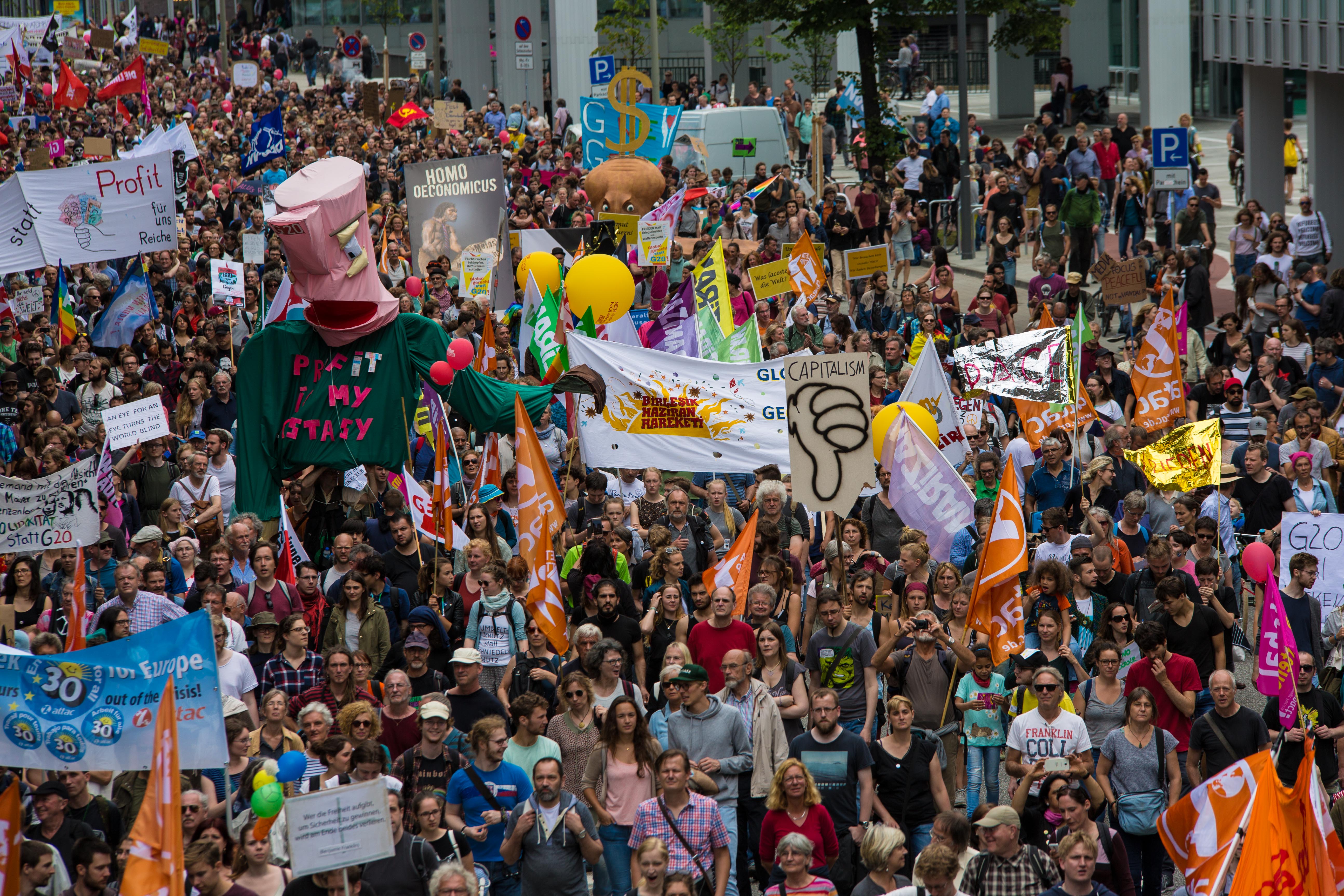Humans get used to quite a lot of things and live their daily life through a set of what we can call habits. Everyday experiences are not much worth a thought as long as everything is like it always is. This can be driving by car to town, only to get stuck in the usual traffic jam, or something very simple like flushing the toilet or using knife and fork to eat a grilled piece of dead cow. All these habits and things constitute a human's normality. It is just what is normal and therefore nothing to wonder or reflect about.
There are voices who call for more wondering though and wish to change the current normality. I am referring to for example deep ecologists, humans concerned about environmental and social justice and members of the degrowth movement. They all call for decolonization of the imaginery, defamiliarization, reimagination or ideological change while meaning that a change towards social and environmental justice, a downscaling of production and consumption and overcoming the growth paradigm/religion, needs a change in both structures and mentality. So the call is clear, but how to actually create that change?
Wondering about this big question I took off to do an internship at the degrowth center Can Decreix located in the South of France. In Can Decreix degrowth is understood as a social movement towards environmental sustainability, social justice and well-being. As a movement away from the hegemony of growth. In Can Decreix degrowth ideas are discussed, developed and tried out. It is a place for experiments with frugal technology and agroecology. Furthermore it is a meeting place for activists and researchers working on degrowth topics. Can Decreix is in a continuous process of transformation and open for volunteers engaging in this process.
While spending six month in Can Decreix experiencing fundamental change and the potential of this experience of change, I decided to further explore how experiences made in a place like Can Decreix might impact individuals, and what role places like Can Decreix can play in answering the call for change of structure and mentality. To better understand what I experienced in Can Decreix and to develop a master thesis around my experiences there, I engaged in ethnographic research. I focused on my own experiences and those of other volunteers in Can Decreix; especially on the experience of leaving Can Decreix and going back to “normal”. What interested me was the experience of contrast and its impact on an individual. Think for example of the moment one arrives in a big city after having hardly met any cars, advertisements or shopping centers etc. for weeks. What I encountered was something like a defamiliarization of the familiar. What had been normal before suddenly became absurd. Instead of just another rush hour you suddenly see spaces which could be used for coming together, urban gardens, playing etc., but which are filled with motorized vehicles instead: transporting one person where there is space for five, using scarce recourses and so on. This isn't to say that these observations could not be disturbing to others, it's just something that we get used to and that seems impossible to change.
To discuss and explain the observations made I used works of various scholars. To understand normalities and how norms, society and individuals are interconnected and interdependent, I explored a model of society/person connections developed by Roy Bhaskar in “The Possibilities of Naturalism” ([1979] 2005). Following this model I describe society as a process and a frame of possibilities, given that conventions and structures make certain practices possible and others not. On this basis I emphasize that these structures and conventions only exist due to humans exercising them.
In Can Decreix norms that are different from those of the surrounding growth society exist. In that sense Can Decreix is a place where a different normality is established and different experiences are possible to be made. To connect personal experiences to the forming of subjectivities also on a theoretical level, I refer to a study by Arun Agrawal (2005). Building on his observation of how unexpected and new experiences influence one's subjectivity, I explore the potential impact of experiencing a different normality. The material of my study shows that experiencing such a different normality provokes changes in perception, values and everyday activities. In the case studied, my interviewees told me how they became aware of possibilities they hadn't seen before, and habits and norms they had never reflected until then. Building on Alf Hornborg's ideas about defamiliarization (Hornborg 2001) and the anthropological concept of cross-cultural experiences (Marcus and Fischer 1986) I describe the experience of having been in Can Decreix as a cross-normality experience that can lead to a defamiliarization of what was formerly considered normal.
Bringing the discussion to a more general level, with the help of various scholars I explore the potential of defamiliarization as such and the potential of places where defamiliarizing experiences can be made. Potential in the sense of what role an experience of defamiliarization and defamiliarizing places can play in the movement for degrowth. One could argue that norms appear to humans as belonging to the universe. This belief, however, David Graeber (2005, 2013) says, is exactly what helps to maintain current power structures. Graeber along with others further argues that a defamiliarization or a becoming aware of the norms and the fact that they are made by humans is needed for a change of society.
Taking evidence form my study I argue that by experiencing a different normality like the one lived in Can Decreix, one becomes able to see that there are alternatives. One starts perceiving that norms are norms and not natural laws and realizes that it is theoretically and practically possible to change them. Making cross-normality experiences is therefore a way to make norms visible and reveal the power humans give to them. Therefore establishing places like Can Decreix is one option to promote a change in mentalities and structures simultaneously.
The study underlines the importance of places like Can Decreix. The importance of making alternative experiences possible. It is not the whole and only recipe for changing the world and not meant to be such. It is rather meant to highlight the potential of working alternatives as part of the strategies for change towards a degrowth future. People who approach places like Can Decreix are already defamiliarized to some degree, as they are looking for alternatives. Still, as it is shown in the study, such experiences of a working alternative make the defamiliarization stronger, give confidence, motivation and ideas. Practicing change on a small scale is shown to be one important part to promote change in mental and physical structure.
The full master-thesis “Who says what is absurd? - A case study on being(s) in an alternative normality” can be downloaded here. After being rewarded with the Kapp research award in September 2014, it is now also available as book, published by the German Association for Ecological Economics (VÖÖ). ------------------------

Was tun, wenn sich die Staats- und Regierungschefs der 20 reichsten Länder der Welt in einer europäischen Großstadt einfinden, um ihre ungerechte Politik in Szene zu setzen? Dieser Frage haben sich zahlreiche linke Organisationen seit letztem Jahr gewidmet. Herausgekommen ist eine bunte Mischung an Protestformen, verteilt über eine Woche. Leider geht die Debatte um den G20-Gipfel aktuell weder ...
While agreeing with many points of van den Bergh's excellent review of the growth versus climate debate, I would like to point to a fundamental misrepresentation of the quoted research on degrowth: degrowth is not a strategy "aimed at reducing the size of the GDP". In fact, the degrowth proposition is that the relationship between fossil fuels/carbon emissions and GDP growth is mutual, and th...

Interview mit Anna Holthaus Anna Holthaus ist Vorstandsmitglied der BUNDJugend. Seit 4 Jahren engagiert sie sich in der BUNDJugend dafür, die Schritte für einen sozial-ökologischen Transformationsprozess und eine Gesellschaft ohne Wachstum anzusteuern. Erfreulicherweise ist die BUNDJugend ein wichtiger Unterstützer der Degrowth-Konferenz in Leipzig. Im Rahmen der Interviewreihe des Projekts “Stream towards Degrowth” blickt Anna Holthaus aus [...]